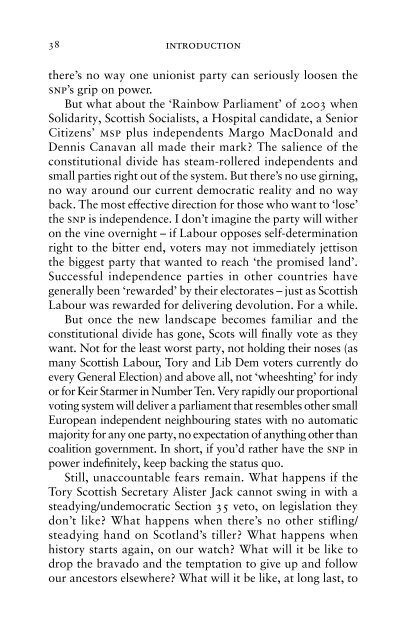Thrive by Lesley Riddoch sampler
Why won’t Scots simmer down? Why batter on about independence when folk voted No a decade back? After all. Scotland’s not as populated as Yorkshire, nor as wealthy as London. But it’s also not as Conservative, as keen on Brexit, or as willing to flog public assets to Tory party pals. So does Nicola Sturgeon’s departure terminally damage the case for independence? The answer, with all respect to her legacy, is no. Scotland has bigger fish to fry. In this book, Lesley Riddoch makes an impassioned call to action, weaving academic evidence with story, international comparison and anecdote to explain why Scotland is ready to step forward as the world’s newest state.
Why won’t Scots simmer down?
Why batter on about independence when folk voted No a decade back?
After all. Scotland’s not as populated as Yorkshire, nor as wealthy as London. But it’s also not as Conservative, as keen on Brexit, or as willing to flog public assets to Tory party pals.
So does Nicola Sturgeon’s departure terminally damage the case for independence?
The answer, with all respect to her legacy, is no.
Scotland has bigger fish to fry.
In this book, Lesley Riddoch makes an impassioned call to action, weaving academic evidence with story, international comparison and anecdote to explain why Scotland is ready to step forward as the world’s newest state.
Create successful ePaper yourself
Turn your PDF publications into a flip-book with our unique Google optimized e-Paper software.
38 Introduction<br />
there’s no way one unionist party can seriously loosen the<br />
SNP’s grip on power.<br />
But what about the ‘Rainbow Parliament’ of 2003 when<br />
Solidarity, Scottish Socialists, a Hospital candidate, a Senior<br />
Citizens’ MSP plus independents Margo MacDonald and<br />
Dennis Canavan all made their mark? The salience of the<br />
constitutional divide has steam-rollered independents and<br />
small parties right out of the system. But there’s no use girning,<br />
no way around our current democratic reality and no way<br />
back. The most effective direction for those who want to ‘lose’<br />
the SNP is independence. I don’t imagine the party will wither<br />
on the vine overnight – if Labour opposes self-determination<br />
right to the bitter end, voters may not immediately jettison<br />
the biggest party that wanted to reach ‘the promised land’.<br />
Successful independence parties in other countries have<br />
generally been ‘rewarded’ <strong>by</strong> their electorates – just as Scottish<br />
Labour was rewarded for delivering devolution. For a while.<br />
But once the new landscape becomes familiar and the<br />
constitutional divide has gone, Scots will finally vote as they<br />
want. Not for the least worst party, not holding their noses (as<br />
many Scottish Labour, Tory and Lib Dem voters currently do<br />
every General Election) and above all, not ‘wheeshting’ for indy<br />
or for Keir Starmer in Number Ten. Very rapidly our proportional<br />
voting system will deliver a parliament that resembles other small<br />
European independent neighbouring states with no automatic<br />
majority for any one party, no expectation of anything other than<br />
coalition government. In short, if you’d rather have the SNP in<br />
power indefinitely, keep backing the status quo.<br />
Still, unaccountable fears remain. What happens if the<br />
Tory Scottish Secretary Alister Jack cannot swing in with a<br />
steadying/undemocratic Section 35 veto, on legislation they<br />
don’t like? What happens when there’s no other stifling/<br />
steadying hand on Scotland’s tiller? What happens when<br />
history starts again, on our watch? What will it be like to<br />
drop the bravado and the temptation to give up and follow<br />
our ancestors elsewhere? What will it be like, at long last, to


















